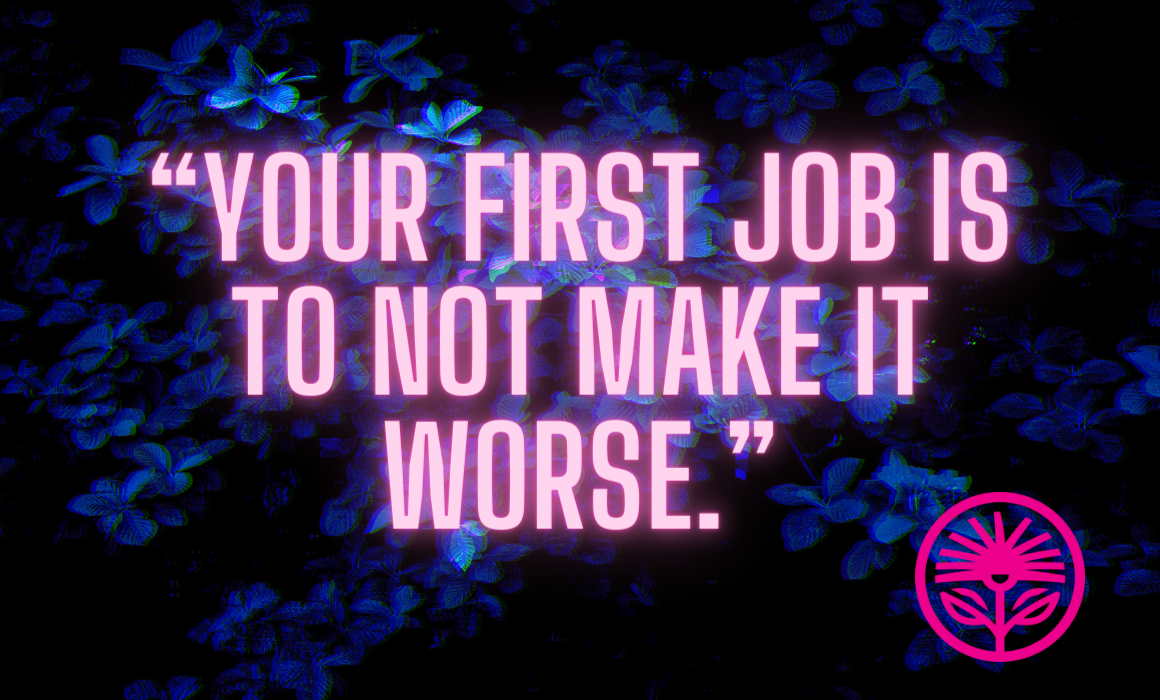Special Issue: “Your first job is to not make it worse.” — The 3 Myths of Crisis Response
An interview with Dr. Dan Dworkis

Business leaders, entrepreneurs, and PR pros work in public, and under pressure.
The pressure to succeed, the pressure to hit performance numbers, the pressure to respond to crises correctly and quickly, under extreme uncertainty.
And, frankly, the pressure of potentially failing in public.
That's why I've tried to learn as much as I can from high performers in higher stakes fields so that I can respond to stress and pressure calmly, cooly, and under my own control.
Over the past year, I’ve had the privilege of getting to know Dr. Dan Dworkis, MD, PhD, emergency physician, and founder of The Emergency Mind Project.
Dan and The Emergency Mind Project “help organizations around the world learn from experts in the ER and beyond to succeed in times of crisis, apply knowledge under pressure, and perform at their best when they’re needed the most.”
For this special edition of Kelford Labs, I sat down with Dr. Dworkis to dig into the details of high performance under stressful conditions.
We started by debunking the biggest myths about how stress and pressure affect our ability to respond.
Because before we can respond at our highest level, we need to understand what might be holding us back:
The 3 Myths of Crisis Response
Myth 1: You can fully rid yourself of the feeling of stress and pressure
Myth 2: Being able to handle stress and pressure is all-or-nothing
Myth 3: Getting better at stress and pressure just happens as a result of working
Myth 1: You can fully rid yourself of the feeling of stress and pressure
I’ll admit, I’ve often wished I could just rid myself of the feeling of stress and pressure. When I feel bad, I want to feel better.
And when I think about situations that make me feel bad, I can tend to try to think of ways I can avoid the feeling.
Often, when I see someone who’s clearly calmer and cooler than I am, I wonder if (and how) they’ve conquered the feeling.
But, Dan says, they haven’t:
Dr. Dworkis: The first thing that’s worth saying is not everything that happens in our body and our brain in the middle of a crisis is actually directly controllable, or under our control even theoretically.
There’s a lot of stuff that’s built into a mammal brain about how we respond to extreme levels of stress that’s going to stay below our control.
“I think that if you’re on a quest to completely control every aspect of your personal response to a crisis, that’s sort of a fool’s errand. Because you’re not going to be able to change a lot of that stuff.”
But we’re not wrong to notice that some people seem to feel less pressure, and seem to be more in control of their response.
Dr. Dworkis: There’s a debate about whether or not that’s an innate character trait or that’s a learnable, trainable skill.
I come down pretty heavily on the side of learnable, trainable skill.
Nobody’s born a fully functional ER doctor. At least I haven’t met any, either in the world of emergency medicine or in the babies I’ve been lucky enough to be there when they’re being born. Nobody comes out fully formed like that.
We don’t expect people to have everything put together, we train them.
But to find somebody where it all goes away forever? I don’t think that happens. I really don’t.
So what do we do instead of wishing the feeling away?
Dr. Dworkis: Don’t try to make everything feel perfect all the time. Instead, try to think to yourself: Okay, well, how can I make my response to a pressure-filled situation better? How can I bring more of my knowledge to bear on this subject?”
“So it’s worth saying, even people that are at the top of their game doing this work still feel things. They still feel stress and pressure. That’s okay. It’s okay to feel stress and pressure. That’s not a thing you need to get rid of. The question is, what do you do about it?”
Myth 2: Being able to handle stress and pressure is all-or-nothing
When I’ve felt overwhelmed by a crisis, or in over my head, it’s easy to spiral and assume that failure is the only option on the table.
But that’s not true. As Dan notes, getting better and being better in the moment is always an option.
Dr. Dworkis: The second myth is you either have no skills or you have all the skills.
And that’s equally not true.
Along the path of being an ER doctor, you’re consistently exposed to higher and higher levels of stress, responsibility, and pressure.
And so your job is not to go from whimpering and cowering in the corner to fully running a cardiac arrest in an unexpected patient.
“Your job is to just get slightly farther than where you are right now. And it’s okay to make incremental improvements. In fact it’s important to make incremental improvements. We train stress and pressure through the accumulation of marginal gains.”
Myth 3: Getting better at stress and pressure just happens as a result of working
When you’ve been doing this for a while, others might assume you’ve got all the answers.
And you might assume you do, too.
But, as Dan points out, if that were true, the oldest, most experienced person in the room would always be right.
But are they?
Dr. Dworkis: The third myth that I think is really important to state is that getting better at stress and pressure is a natural side effect of working. It’s like an accidental byproduct of doing your job.
And I think that’s not at all true.
There’s this idea that if you just keep showing up, eventually you’re going to get better at handling the pressure and things will work itself out.
There’s some degree of acclimation that happens, but that’s not quite the same thing as saying that performing under pressure is a natural side effect of showing up.
Time on target is necessary but not sufficient to train performance under pressure. You have to actively train it as its own thing.
Just like you wouldn’t expect to get magically better at playing piano through the osmosis of reading books about playing piano. You need to actually train the thing that you’re trying to do.
“So if performance under pressure is part of your job requirement, then you need to train performance under pressure in addition to whatever else you’re doing.”
How to Get Better Under Stress and Pressure
We feel bad when we feel unsure. Especially when others expect us (and we expect ourselves) to have the answers.
But we can learn to use those feelings to our benefit, and to guide our behavior—and our teams’ behavior—toward higher performance.
So if the goal isn’t to get rid of the feeling, and we’re committed to making incremental gains, where do we start?
Dr. Dworkis: One of the first things you’re going to do is develop the skill of interoception—the internal radar of what’s going on within you. You want to really fine-tune that.
That’s super uncomfortable because that involves you sitting down and looking at what happens in your body and your brain when you’re in high stakes, high stress situations.
But your job is to try to recognize these signals on the earlier side of things.
You can think about a guitar string: It has to be tuned at exactly the right tension to get the proper note out of it. We tend to work like that as human beings.
So your job as you’re starting this is to identify the differences between those three sounds: What it should sound like, what a little out of tune is like, and what holy hell things are falling apart feels like.
Because, again, it’s not zero or a million, you have to find those shades in there.
But why does this matter? If I can’t get rid of the feeling, why should I think about it?
“Why do you care about that? Because if you find that you’re completely out of tune and about to break, you need to deploy one set of skills. If you’re just a little bit out of line, you’ve got to deploy a separate set of skills. And if you’re right on—amazing—you’re going to deploy a third set of skills that keeps you going in that zone. But the first step is always understanding your unique signals of what that feels like to you.”
What am I looking for when I start to pay attention?
Dr. Dworkis: These are typically things like physiologic changes: your heart races and you sweat and you get really hot or really cold.
Sometimes they are external changes in communication and teamwork. Like, your voice changes or you might dip into an accent you had as a kid.
And often there are mental changes as well. You might notice different patterns to your thoughts that aren’t present when you are under different parts of physiologic or psychologic load.
What I usually encourage folks to start with is: Go back in their mind to some stressful situation, drop in, and say, okay, what did this feel like? What do I notice? What happens if I get curious about that? Can I identify some of these things?
That will be the baseline on top of which we will layer things like: What do you do when you feel those feelings?
Okay, but what if I’m in it now? How do I pull myself back out and get control?
Your first job is to not make it worse. To hold the ground that you have, whatever that is.
So it’s very easy to go into a death spiral: I’m under pressure, I feel sweaty and hot, I assume everybody notices I’m sweaty and hot, I therefore feel more self-conscious, I feel worse, my performance degrades, and you fall off that curve until there’s not much left.
The self-talk just destroys you.
So one of the first things that I think is worth saying is, “Can you name what you’re feeling?”
‘I am feeling hot and sweaty.’ ‘This is the feeling I get when I am slightly too stressed.’ Or, ‘This is the feeling I get when things are totally off the rails.’
Remember, it’s okay to feel all this stuff. You’re going to get yourself out of it.
But most humans have things they feel when they’re under pressure.
“So if you’re getting mad at yourself for feeling a little hot and sweaty when you’re under pressure, you’re getting mad at yourself for being human. Which is completely not productive in any way, shape, or form.”
Your task, your team, needs you to focus on them. They don’t need you being mad at being human. It’s just not productive.
It’s about the accumulation of marginal gains. You don’t have to go from terrified to, you know, being able to fly a fighter jet in one minute. You’re just going to move yourself along that pathway by not making things worse.
So how do we prepare before a crisis?
Dr. Dworkis: This gets into a really core concept for us, which is the concept of a Reflex Package.
So these are sets of tools that we’re going to put in place ahead of time that we can deploy in the middle of a zero-notice event before our brain has caught up to us, or caught up to the reality.
So, ahead of time, you might say: “Well, if I find myself in a PR nightmare, of any sort, here are the first three things I’m going to do.”
This is “Break Glass in Case of Fire.” And what happens when you break glass in case of fire? Well, there’s the things you would do in there to fight a fire.
Why do we put those things in that box? Because those are the things you need to do to fight a fire.
“You could ask yourself: What are the first three things that I could do if I find myself in a PR crisis? And how can I set those up to activate ahead of time?”
That’s a really, actually, surprisingly deep question: How do I make myself likely to do the right thing? How do I make the system likely to nudge me in the right direction? And how do I make the default next action when I’m on tilt and confused likely to be the right next action?
When in doubt, make the universe around you more favorable.
The point of a reflex is, whatever crisis you find yourself in, this will make you at least not worse and probably slightly better.
How can entrepreneurs and PR pros, who are always “on call,” get control over their stress and perform at their best?
“So one of the things I would suggest folks in that situation do is look and really pay attention to the times when they’re more off than they are on. Because it can feel like you’re always on all the time. But that’s probably not usually the case.”
But in order to do that, you actually have to learn to become sensitive to the spaces between things happening.
Sometimes you do have to be on for long periods of time. In those cases, you know, sometimes what you’re doing is not making it worse, and you’re monitoring your own situation like that.
Sometimes it’s running through things ahead of time in your mind about likely scenarios.
And sometimes it is building more of an internal reflex package about, okay, when I get called, these will be the first three things I will do. And then my brain will catch up to me as I do it.
I think that these Reflex Packages work best when you talk about them. When you explore them with each other, when you share with them what’s going on, and especially if you’re a team that has to be operating these things together.
With Reflex Packages, you can make one and one equal three, ten, or three hundred. If you don’t communicate about them, though, you can make one and one equal to negative forty. You can screw your team entirely if you don’t practice and plan these things ahead of time.
So, yeah, it’s an individual skill, but it’s really an individual skill in the context of a team.
How can people learn and train more?
“For teams to develop this, I think there’s a lot of stuff in there. And this is a lot of the work we do at The Emergency Mind Project is helping teams develop these types of packages.”
If your team would benefit from specialized training on performance under pressure, visit The Emergency Mind Project.
If you’d like to learn the models, strategies, and techniques for marketers that will help them avoid crises and capitalize on emerging opportunities, visit Kelford Inc.



